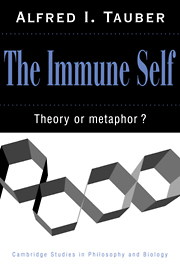Book contents
- Frontmatter
- Contents
- Acknowledgments
- Introduction
- 1 The phagocytosis theory
- 2 The triumph of immunology
- 3 The immune self declared
- 4 From theory to metaphor
- 5 Immunology gropes for its theory
- 6 The self and the phenomenological attitude
- 7 The self as organism: A philosophical consideration
- 8 The search for identity
- Notes
- References
- Index
8 - The search for identity
Published online by Cambridge University Press: 14 January 2010
- Frontmatter
- Contents
- Acknowledgments
- Introduction
- 1 The phagocytosis theory
- 2 The triumph of immunology
- 3 The immune self declared
- 4 From theory to metaphor
- 5 Immunology gropes for its theory
- 6 The self and the phenomenological attitude
- 7 The self as organism: A philosophical consideration
- 8 The search for identity
- Notes
- References
- Index
Summary
FROM NIETZSCHE TO FOUCAULT
Those who argue that we are now in a postmodernist age often cite Nietzsche's attack on the Enlightenment (a critique profoundly and disturbingly extended by Heidegger) as the origin of a new vision of the self. As already discussed, Nietzsche's mature position corresponds closely to the presentation of Metchnikoff's theory of immunity and the midpoint of James's writings of Principles. Thus Spoke Zarathustra (composed between 1883 and 1885) and The Will to Power (edited selections from his last notebooks, 1883-8) were written during this period. If Metchnikoff offered a biological formulation of the self, and James an epistemological definition, then Nietzsche is the metaphysician who proclaims self-affirmation and self-assertion as the process of returning to the self's essence and origins, as the process, that is, of becoming. Nietzsche makes no attempt to re-create a Kantian enlightenment ideal of critical self-consciousness based on assumed “values ” or an assumed epistemological foundation (Behler 1991, pp. 20ff). There is no traditional appeal to nature or any transcendental subject as a source of value:
Self-determination or Nietzschean “affirmation” could no longer be linked in any way to the cosmos, one's true self, real happiness, complete rational autonomy, or one's realization within the historical community. What the idea of a modern epoch had sown and what Kant had cultivated, Nietzsche would now reap.
(Pippin, 1991, p. 120)- Type
- Chapter
- Information
- The Immune SelfTheory or Metaphor?, pp. 269 - 296Publisher: Cambridge University PressPrint publication year: 1994



